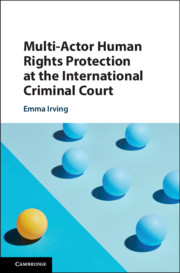Book contents
- Multi-Actor Human Rights Protection at the International Criminal Court
- Multi-Actor Human Rights Protection at the International Criminal Court
- Copyright page
- Dedication
- Contents
- Introduction
- 1 The Human Rights Obligations of the ICC
- Part I Multi-Actor Human Rights Protection
- 2 The Human Rights Obligations of States Parties to the Rome Statute
- 3 Suspects, Accused, Convicted, and Acquitted
- 4 Witnesses
- Part II Multi-Actor Human Rights Protection
- Part III Evaluation and Proposals
- Bibliography
- Index
2 - The Human Rights Obligations of States Parties to the Rome Statute
from Part I - Multi-Actor Human Rights Protection
Published online by Cambridge University Press: 28 February 2020
- Multi-Actor Human Rights Protection at the International Criminal Court
- Multi-Actor Human Rights Protection at the International Criminal Court
- Copyright page
- Dedication
- Contents
- Introduction
- 1 The Human Rights Obligations of the ICC
- Part I Multi-Actor Human Rights Protection
- 2 The Human Rights Obligations of States Parties to the Rome Statute
- 3 Suspects, Accused, Convicted, and Acquitted
- 4 Witnesses
- Part II Multi-Actor Human Rights Protection
- Part III Evaluation and Proposals
- Bibliography
- Index
Summary
States Parties to the Rome Statute have obligations to protect the human rights of witnesses and accused appearing before the ICC. This chapter sets out the general sources of these obligations both within and beyond the Rome Statute protection framework. Obligations arising within the Rome Statute protection framework stem from either specific Rome Statute provisions or from cooperation requests issued by the ICC pursuant to its powers under Part 9 of the Statute. Beyond the Rome Statute protection framework States have a wide range of obligations to protect human rights, stemming from human rights law treaties and customary law norms. Non-States Parties to the Rome Statute do not derive obligations directly from the Statute, but in situations where such States become involved in the work of the Court, they can acquire obligations connected to the Rome Statute. This can occur where a non-State Party submits an Article 12(3) declaration, where they are referred to the ICC by the UN Security Council, or where they voluntarily agree to assist the Court in its work.
- Type
- Chapter
- Information
- Publisher: Cambridge University PressPrint publication year: 2020

